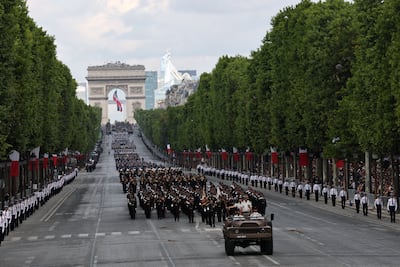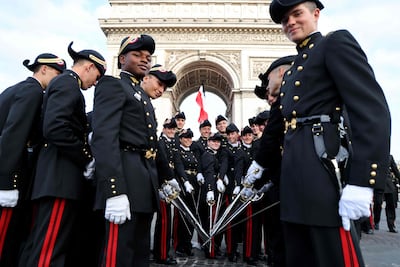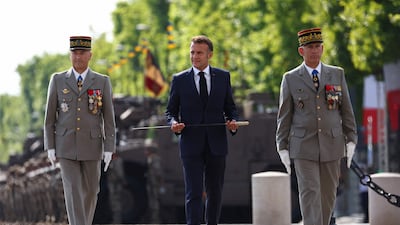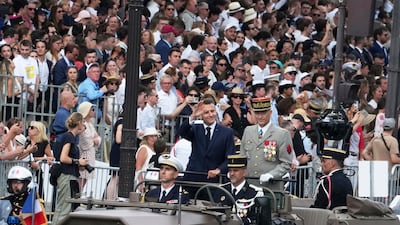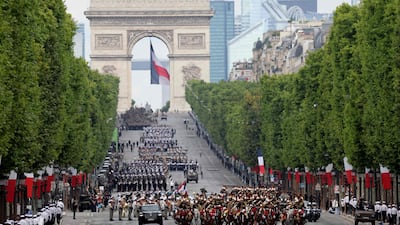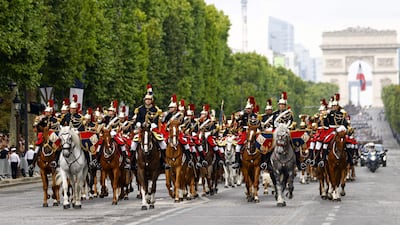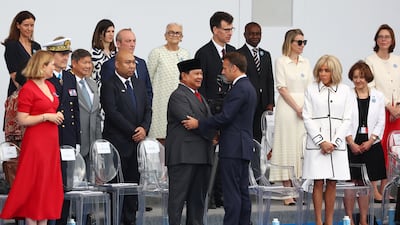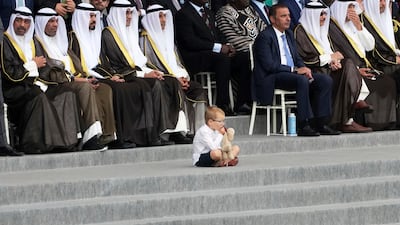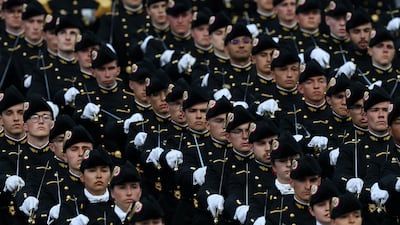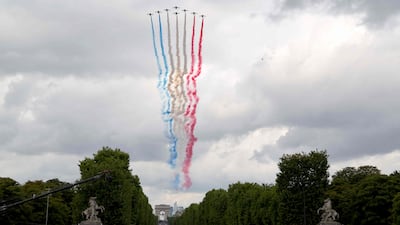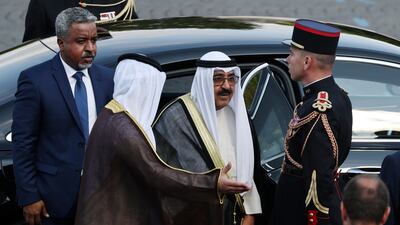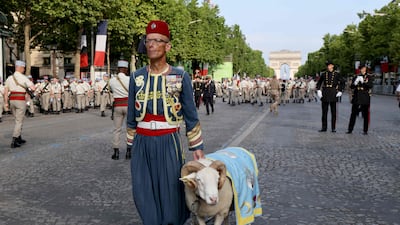President Emmanuel Macron has announced a plan for a massive boost to France's defence spending, saying freedom in Europe was facing a greater threat than at any time since the end of Second World War.
Europe is in danger because of Russia’s war in Ukraine and wars in the Middle East, and because “the United States has added a form of uncertainty,″ Mr Macron said in a speech to the armed forces on the eve of the national Bastille Day holiday and military parade.
Other dangers he cited included online disinformation campaigns by unnamed foreign governments and propaganda operations targeting children, in ″the screen era″.
Mr Macron reviewed the troops and relit the eternal flame beneath the Arc de Triomphe as part of the annual parade on Monday. Bastille Day is France's biggest holiday, with 7,000 people marching, on horseback or riding armoured vehicles along the Champs-Elysees, the most iconic avenue in Paris. The Paris event included flyovers by fighter jets, trailing red, white and blue smoke. The evening was due to see a drone light show and fireworks at the Eiffel Tower that have become more elaborate every year.
Mr Macron pledged an acceleration of national defence spending, with the budget set to reach €64 billion ($74.7 billion) by 2027, instead of the previously scheduled 2030 target. He confirmed that the increased funding would not be financed through borrowing but rather by stimulating the national economy.
Mr Macron said the extra funds would address critical shortcomings, including ammunition shortages, and support the development of smart and precision weaponry, as well as capabilities in unmanned aerial systems, space defence and electronic warfare. The budget will also support the modernisation of ground-based air defence systems.
“We are living a pivotal moment,” Mr Macron said. He denounced “imperialist policies”, “annexing powers” and the notion that “might is right” − all a reference to Russia.
France faced the challenge “of remaining free and masters of our destiny”, he added.
Mr Macron said France's defence budget should rise by €3.5 billion ($4.1 billion) in 2026, and then by a further €3 billion in 2027.
“Never since 1945 has freedom been so threatened, and never has peace on our continent depended so much on the decisions we take today,” Mr Macron said. “Let’s put it simply: To be free in this world, you need to be feared, and to be feared you need to be powerful.”
Mr Macron also announced that he had tasked Armed Forces Minister Sebastien Lecornu with initiating a strategic dialogue with European partners on the future role of France’s nuclear deterrence, with the outcome to be presented by the end of the year.
French military and security officials have been warning of global threats weighing on France, with defence chief of staff Thierry Burkhard saying on Friday that Russia posed a “durable” threat to Europe and that the “rank of European countries in tomorrow's world” was being decided in Ukraine, invaded by Russia in 2022.
France's defence budget has already increased sharply since Mr Macron took power, rising from €32.2 billion in 2017 to €50.5 billion currently, and is projected to reach €67 billion in 2030.
Mr Lecornu recently said France was concerned about falling behind in “disruptive technologies”, including artificial intelligence and quantum technology.
German warning
Meanwhile, Germany’s Defence Minister Boris Pistorius has called for weapons makers to step up and “deliver” on re-arming Europe by increasing production to match spending plans.
Mr Pistorius told the Financial Times his government had addressed long-standing industry concerns by streamlining hundreds of billions of euros of new military spending. “The industry knows perfectly well that it is now responsible for delivering.”
He said Germany was experiencing delays on individual projects. “Industry needs to ramp up its capacities. That applies to ammunition, to drones, to tanks − really to almost every area.”
Mr Pistorius heads to Washington on Monday to meet US Defence Secretary Pete Hegseth, to seek clarity on American arms supplies to Ukraine, missile deployment plans and the future of US troop levels in Europe.
Germany loosened its constitutional debt brake to meet Nato's new core military spending target of 3.5 per cent of national output by 2029.
The move will boost German defence spending to €162 billion in 2029, from €95 billion in the draft budget for 2025.
War threat
Wars in Ukraine and the Middle East have transformed the security outlook for Western nations, forcing many to reassess long-standing reluctance to allocate resources to armed forces.
Several Nato countries are boosting their military spending, after the alliance's members agreed last month to spend five per cent of their gross domestic product on security.
Britain aims to increase its defence budget to 2.5 per cent of GDP by 2027, and to 3 per cent after 2029, while Poland already dedicates 4.7 per cent of GDP to defence.
Timeline
2012-2015
The company offers payments/bribes to win key contracts in the Middle East
May 2017
The UK SFO officially opens investigation into Petrofac’s use of agents, corruption, and potential bribery to secure contracts
September 2021
Petrofac pleads guilty to seven counts of failing to prevent bribery under the UK Bribery Act
October 2021
Court fines Petrofac £77 million for bribery. Former executive receives a two-year suspended sentence
December 2024
Petrofac enters into comprehensive restructuring to strengthen the financial position of the group
May 2025
The High Court of England and Wales approves the company’s restructuring plan
July 2025
The Court of Appeal issues a judgment challenging parts of the restructuring plan
August 2025
Petrofac issues a business update to execute the restructuring and confirms it will appeal the Court of Appeal decision
October 2025
Petrofac loses a major TenneT offshore wind contract worth €13 billion. Holding company files for administration in the UK. Petrofac delisted from the London Stock Exchange
November 2025
180 Petrofac employees laid off in the UAE
Janet Yellen's Firsts
- In 2014, she became the first woman to lead the US Federal Reserve
- In 1999, she became the first female chair of the White House Council of Economic Advisers
Other ways to buy used products in the UAE
UAE insurance firm Al Wathba National Insurance Company (AWNIC) last year launched an e-commerce website with a facility enabling users to buy car wrecks.
Bidders and potential buyers register on the online salvage car auction portal to view vehicles, review condition reports, or arrange physical surveys, and then start bidding for motors they plan to restore or harvest for parts.
Physical salvage car auctions are a common method for insurers around the world to move on heavily damaged vehicles, but AWNIC is one of the few UAE insurers to offer such services online.
For cars and less sizeable items such as bicycles and furniture, Dubizzle is arguably the best-known marketplace for pre-loved.
Founded in 2005, in recent years it has been joined by a plethora of Facebook community pages for shifting used goods, including Abu Dhabi Marketplace, Flea Market UAE and Arabian Ranches Souq Market while sites such as The Luxury Closet and Riot deal largely in second-hand fashion.
At the high-end of the pre-used spectrum, resellers such as Timepiece360.ae, WatchBox Middle East and Watches Market Dubai deal in authenticated second-hand luxury timepieces from brands such as Rolex, Hublot and Tag Heuer, with a warranty.
The specs: 2018 Nissan Patrol Nismo
Price: base / as tested: Dh382,000
Engine: 5.6-litre V8
Gearbox: Seven-speed automatic
Power: 428hp @ 5,800rpm
Torque: 560Nm @ 3,600rpm
Fuel economy, combined: 12.7L / 100km
AI traffic lights to ease congestion at seven points to Sheikh Zayed bin Sultan Street
The seven points are:
Shakhbout bin Sultan Street
Dhafeer Street
Hadbat Al Ghubainah Street (outbound)
Salama bint Butti Street
Al Dhafra Street
Rabdan Street
Umm Yifina Street exit (inbound)
The President's Cake
Director: Hasan Hadi
Starring: Baneen Ahmad Nayyef, Waheed Thabet Khreibat, Sajad Mohamad Qasem
Rating: 4/5
Tips for job-seekers
- Do not submit your application through the Easy Apply button on LinkedIn. Employers receive between 600 and 800 replies for each job advert on the platform. If you are the right fit for a job, connect to a relevant person in the company on LinkedIn and send them a direct message.
- Make sure you are an exact fit for the job advertised. If you are an HR manager with five years’ experience in retail and the job requires a similar candidate with five years’ experience in consumer, you should apply. But if you have no experience in HR, do not apply for the job.
David Mackenzie, founder of recruitment agency Mackenzie Jones Middle East
Wicked: For Good
Director: Jon M Chu
Starring: Ariana Grande, Cynthia Erivo, Jonathan Bailey, Jeff Goldblum, Michelle Yeoh, Ethan Slater
Rating: 4/5
UAE currency: the story behind the money in your pockets
10 tips for entry-level job seekers
- Have an up-to-date, professional LinkedIn profile. If you don’t have a LinkedIn account, set one up today. Avoid poor-quality profile pictures with distracting backgrounds. Include a professional summary and begin to grow your network.
- Keep track of the job trends in your sector through the news. Apply for job alerts at your dream organisations and the types of jobs you want – LinkedIn uses AI to share similar relevant jobs based on your selections.
- Double check that you’ve highlighted relevant skills on your resume and LinkedIn profile.
- For most entry-level jobs, your resume will first be filtered by an applicant tracking system for keywords. Look closely at the description of the job you are applying for and mirror the language as much as possible (while being honest and accurate about your skills and experience).
- Keep your CV professional and in a simple format – make sure you tailor your cover letter and application to the company and role.
- Go online and look for details on job specifications for your target position. Make a list of skills required and set yourself some learning goals to tick off all the necessary skills one by one.
- Don’t be afraid to reach outside your immediate friends and family to other acquaintances and let them know you are looking for new opportunities.
- Make sure you’ve set your LinkedIn profile to signal that you are “open to opportunities”. Also be sure to use LinkedIn to search for people who are still actively hiring by searching for those that have the headline “I’m hiring” or “We’re hiring” in their profile.
- Prepare for online interviews using mock interview tools. Even before landing interviews, it can be useful to start practising.
- Be professional and patient. Always be professional with whoever you are interacting with throughout your search process, this will be remembered. You need to be patient, dedicated and not give up on your search. Candidates need to make sure they are following up appropriately for roles they have applied.
Arda Atalay, head of Mena private sector at LinkedIn Talent Solutions, Rudy Bier, managing partner of Kinetic Business Solutions and Ben Kinerman Daltrey, co-founder of KinFitz
KILLING OF QASSEM SULEIMANI
UAE currency: the story behind the money in your pockets
The specs: 2018 Ducati SuperSport S
Price, base / as tested: Dh74,900 / Dh85,900
Engine: 937cc
Transmission: Six-speed gearbox
Power: 110hp @ 9,000rpm
Torque: 93Nm @ 6,500rpm
Fuel economy, combined: 5.9L / 100km
COMPANY%20PROFILE%20
%3Cp%3EName%3A%20DarDoc%3Cbr%3EBased%3A%20Abu%20Dhabi%3Cbr%3EFounders%3A%20Samer%20Masri%2C%20Keswin%20Suresh%3Cbr%3ESector%3A%20HealthTech%3Cbr%3ETotal%20funding%3A%20%24800%2C000%3Cbr%3EInvestors%3A%20Flat6Labs%2C%20angel%20investors%20%2B%20Incubated%20by%20Hub71%2C%20Abu%20Dhabi's%20Department%20of%20Health%3Cbr%3ENumber%20of%20employees%3A%2010%3C%2Fp%3E%0A
How to apply for a drone permit
- Individuals must register on UAE Drone app or website using their UAE Pass
- Add all their personal details, including name, nationality, passport number, Emiratis ID, email and phone number
- Upload the training certificate from a centre accredited by the GCAA
- Submit their request
What are the regulations?
- Fly it within visual line of sight
- Never over populated areas
- Ensure maximum flying height of 400 feet (122 metres) above ground level is not crossed
- Users must avoid flying over restricted areas listed on the UAE Drone app
- Only fly the drone during the day, and never at night
- Should have a live feed of the drone flight
- Drones must weigh 5 kg or less
HEADLINE HERE
- I would recommend writing out the text in the body
- And then copy into this box
- It can be as long as you link
- But I recommend you use the bullet point function (see red square)
- Or try to keep the word count down
- Be wary of other embeds lengthy fact boxes could crash into
- That's about it
The fake news generation
288,000 – the number of posts reported as hate speech that were deleted by Facebook globally each month in May and June this year
11% – the number of Americans who said they trusted the news they read on Snapchat as of June 2017, according to Statista. Over a quarter stated that they ‘rarely trusted’ the news they read on social media in general
31% - the number of young people in the US aged between 10 and 18 who said they had shared a news story online in the last six months that they later found out was wrong or inaccurate
63% - percentage of Arab nationals who said they get their news from social media every single day.
The specs
Engine: 3.0-litre six-cylinder turbo
Power: 398hp from 5,250rpm
Torque: 580Nm at 1,900-4,800rpm
Transmission: Eight-speed auto
Fuel economy, combined: 6.5L/100km
On sale: December
Price: From Dh330,000 (estimate)
